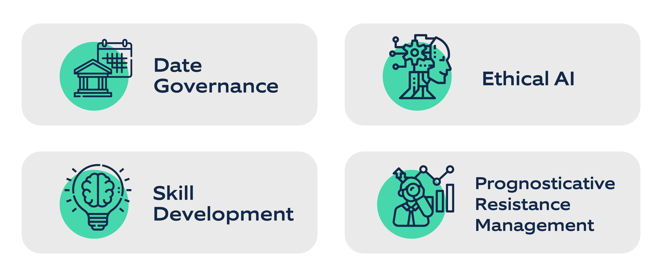The predictive product management industry is expected to grow at a CAGR of 21% from 2021 to 2026. What is the possible reason behind this exponential growth? Let’s answer it! The instinctive dynamic nature of the business landscape makes it more susceptible to rapid trend shifts. Changes in customer preferences and demands, influence businesses to adapt to these changes.
Now, the question arises, how businesses can swiftly adapt to such changes and stay relevant . The possible answer lies in predictive product management. Fueled by the power of AI, it has the potential to be a game changer for any business. A data-driven approach helps in informed decision making. In this article, we will cover how predictive product management can help businesses stay relevant.
What does the current ball game of the market indicate?
The conventional ways of product management are facing rapid transformation. The conventional aspect of product management presents it as highly dependent on market research, historical data, and let’s say, gut instincts. But the current trends are proving this approach inefficient. Therefore, predictive product management comes into the picture with its clear data-driven approach. Let’s see the evident trends of the current market fueling predictive product management.
Date Abundance
As per IDC research, the global datasphere is estimated to grow up to 175 zettabytes by 2025. Therefore, we are living in a data-rich era. AI algorithms play a vital role in sifting endless data to offer meaningful and actionable insights, helping businesses to make more informed decisions.
Real-time analysis
A McKinsey report highlights the importance of real-time analytics. It states that leveraging real-time data analytics helps score 19% growth in managing cash flow. AI will enable product managers to explore real-time market information. As a result, they can offer quick responses to customer feedback and dynamic trends.
Personalization
According to an Epsilon study, 80% of customers are much more likely to purchase if brands provide customization as per their preferences. The demand for personalized products and experiences has significantly increased. And AI can help in achieving this customization.
Competitive Intelligence
A Deloitte survey found that 48% of organizations use AI to enhance decision-making. AI-powered tools can screen competitors' activities and market traits, offering an aggressive edge in product development and methodology.
Understanding predictive product management
Why?
At its core, predictive product control addresses the issues concerning– staying relevant and ahead in a dynamic market. It's about looking forward to traits, responding to consumer demands, and outperforming competitors, ensuing sustained achievement and growth.
How?
It encompasses leveraging AI and data-driven insights to make knowledgeable choices. Predictive product control employs real-time analytics, personalization, and competitive intelligence, ensuring agencies can adapt swiftly and strategically.
What?
It has tangible outcomes and the potential to provide personalized products, optimize operations, and advantage a competitive aspect, all crucial for thriving in the modern fast-evolving business landscape.
In essence, predictive product management is set proactively embracing trade to acquire lasting commercial enterprise success.
What are the obstacles in predictive product management?
Some common challenges that organizations may face in leveraging predictive product management are:
Data quality
As per Gartner’s research, it costs an organization around $15 million/year due to inadequate data quality. And the main foundation of AI algorithms is data. So, it directly impacts the prediction qualities. Therefore, ensuring data accuracy is a major hurdle for organizations.
Privacy concerns
A Pew Research survey showed that around 79% of Americans are worried about data privacy. Therefore, taking data from the consumers and using it raises several questions. So, organizations need to strike a balance between the need for customization and ensuring customer privacy.
AI skillset
The domain also requires highly skilled individuals. As per a LinkedIn survey, the AI skill set is one of the most demanding professions now. However, the availability of skillset is not up to the mark with the demand.
Change management
Internal resistance is also a major issue for organizations. Therefore, evolving appropriate change management strategies is crucial as highlighted in the Harvard Business Review article for the AI industry.
The bright side of the picture!
The above-mentioned challenges are not completely indomitable. Let’s see some of the possible solutions:
 Date governance
Date governance
Data governance is an effective solution for ensuring alignment with privacy guidelines. According to a study conducted by Experian Data Quality, 95% of organizations found positive changes with data quality initiatives. Therefore, investing in data cleansing and validation tools is a good option.
Ethical AI
Ethical AI practices will bring more transparency and ensure effective customer communication. Harvard Business Review also argued about the importance of ethical AI for building trust between the business and its target customers.
Skill Development
As per a survey by PwC, around 69% of executives think that AI is the foundation of future businesses. Therefore, investing in upskilling is a major change organizations must implement. Here, AI consulting firms like Nagarro effectively bridge the gap between the demand and the upskill.
Prognosticative resistance management
Research by McKinsey says that 70% of change programs fail because of employee resistance. Therefore, it is crucial to take proactive measures to manage possible resistance before implementing the changes.
Use cases
Predictive product management is finding its uses in different industries. Some of the major use cases are as follows.
Retail industry 
One of the studies conducted by Accenture said that 91% of customers prefer a brand which provides customized offers and recommendations. AI builds these offers and recommendations after analyzing a consumer’s purchase history. The prediction for future buying patterns also helps the retailers to manage their inventories in a more optimized manner. For instance, fashion retailers like H&M use predictive product management for predicting target market segmentation and sales forecasting.
Healthcare industry 
It can also be used for predicting disease outbreaks. or health issues of an individual based on historical health data. Patients can take proactive measures to avoid such health concerns. For instance, Washington University School of Medicine states that predictive product management is used to forecast renal disease chances in diabetic patients.
Finance industry 
Predictive product management can help in providing insights regarding future market fluctuations. They can be used for identifying investment threats and managing risks. Cyber security and fraud mitigation are two of the most popular use cases of predictive product management in the finance industry.
Manufacturing industry 
Deloitte researched on the involvement of AI in the manufacturing industry. The results showed that it helps to decrease the maintenance cost by 20% and the unplanned downtime by 50%.
How we can help
At Nagarro, our approach to Predictive Product Management is informed by means of studies and a deep know-how of industry dynamics. We understand that Predictive Product Management isn't just about implementing AI algorithms; it is about strategic transformation.
We offer tailored AI solutions that deal with the challenges confronted by every enterprise. Whether it's data quality assurance, AI model evolution, or change management techniques, Nagarro offers a holistic approach to Predictive Product Management.
- Improved Customer Satisfaction: By personalizing services and products based totally on predictive insights, as the requirement highlighted in a Forrester survey.
- Operational Efficiency: By implementing AI-powered supply chain optimization and predictive maintenance.
- Competitive Advantage: Working one step ahead of marketplace traits and outperforming competitors, as confirmed through benchmarking studies.
Nagarro as your service provider
Predictive product management's effect is profound across industries, improving client delight, operational performance, and competitive benefit. Nagarro, a leader in this discipline, gives tailor-made AI solutions, supporting organizations that thrive in this period of transformation. Embracing predictive product control now could be the key to not just surviving but excelling within the ever-evolving business landscape.
Nagarro serves as a pivotal service company in API control in the context of predictive product management. With a focus on customization, Nagarro develops specialized APIs that connect predictive algorithms to vital statistics assets, making sure an unbroken go with the flow of information vital to predictive product control.
Nagarro also addresses the fundamental requirement of records quality guarantee, employing data cleaning and validation gear to guarantee that the records accessed via APIs are reliable and accurate. Furthermore, we facilitate the evolution of AI fashions, permitting companies to adapt to converting marketplace conditions.
Ultimately, Nagarro empowers businesses to take advantage of an aggressive aspect by staying ahead of marketplace traits, offering benchmarking studies, and enabling information-pushed selection-making. Our understanding of API management is a cornerstone in a hit predictive product control adoption, assisting groups to thrive in an ever-evolving marketplace panorama.





